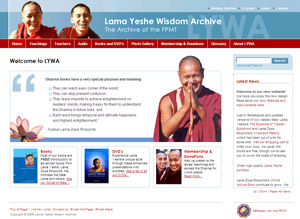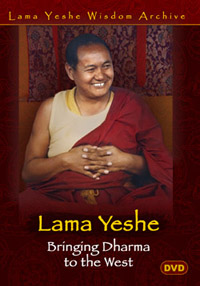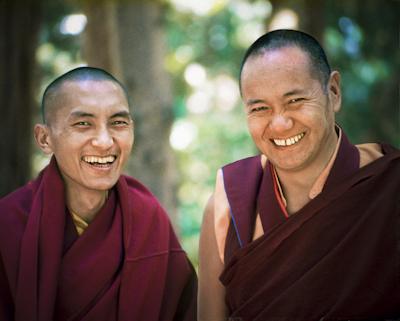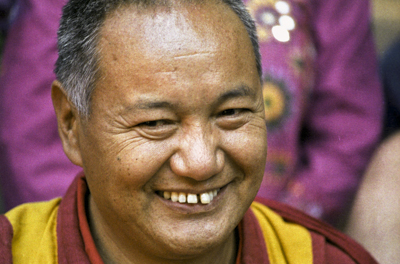Dear LYWA Friends and Supporters,
Thank you for reading and forwarding on our monthly e-letter.
The new LYWA website
The big news is that we have launched our new website. First I have to thank our unbelievable webmaster Jennifer Barlow for, of course, her years of work at the Archive in general and her amazing efforts in developing and maintaining our website over the past decade, but especially for launching this new one. A sincere thanks also to the team of volunteers who worked with Jen and managed to convert all of our content to the new design.

Please check it out and note the following improvements:
- A spacious design making for easy reading;
- Categories and keywords assigned to all teachings making it easier to find what you're looking for;
- A universal audio player;
- Email alerts for your favorite teachers and topics newly added to the site;
- Shopping cart login for faster ordering and easy order tracking;
- Multiple payment and shipping options.
You can read more about these improvements on our Latest News page.
New books and Lama Yeshe DVD
Our recently reprinted books, Lama Yeshe’s The Essence of Tibetan Buddhism and Lama Zopa Rinpoche’s Virtue and Reality are now available. Please let us know if you would like us to send them to you or anybody else.
 We have just sent our next Lama Yeshe DVD, Bringing Dharma to the West, to our manufacturers. It should be available in a couple of weeks.
We have just sent our next Lama Yeshe DVD, Bringing Dharma to the West, to our manufacturers. It should be available in a couple of weeks.
In October 1982, after the visit of His Holiness the Dalai Lama to Istituto Lama Tsongkhapa, Italy, which Lama Yeshe arranged, Lama was interviewed on behalf of the Meridian Trust, the Buddhist film and video archive, by Geoff Jukes, Meridian’s founder, and Brian Beresford.
In the first interview, Lama explains how he and Lama Zopa Rinpoche first began teaching Buddhism to Westerners, how to teach Dharma in the West, the form Buddhism might take in its transition from East to West, the development of the first FPMT centers…and more.
In the second interview, Lama details how the first centers began, what their purpose was, how life in the centers should be, how he selected the resident teachers and what their relationship with the center’s administration should be, how the different aspects of the community—ordained students, lay students and families—should interact with each other…and more.
These interviews offer a fascinating insight into one of the greatest Tibetan masters to come out of Tibet and one of the most effective in bringing the teachings of the Buddha to the world at large. A great inspiration.
This month’s e-letter teaching is an excerpt from one of these interviews. We also gave you a taste in an e-letter a couple of years ago.
Opportunities for Support of Virtuous Projects
As a show of solidarity with the Dalai Lama and Tibet, Geoff Jukes and our other friends and colleagues at the Meridian Trust, who filmed our forthcoming Lama Yeshe DVD, Bringing Dharma to the West, have collaborated on a historic double album of music titled Songs for Tibet: The Art of Peace. Created by twenty artists, including Suzanne Vega, Moby, Rupert Hine, Dave Matthews, Rush, Jackson Browne, Alanis Morissette, Sting and Joan Armatrading, the funds raised from the album by the Art of Peace Foundation will go to support peace initiatives and Tibetan cultural preservation projects important to the Dalai Lama.
Also, Kopan Monastery has announced an international web auction to benefit the Animal Liberation Sanctuary in Nepal on November 7-9 2008. The Animal Liberation Sanctuary is a project Lama Zopa Rinpoche established to provide shelter, care, and more importantly, Dharma, for animals rescued from being killed. Your support is needed to help care for the animals. Through this international web auction, you will have the opportunity to bid on items donated by Rinpoche himself as well as other great masters, while at the same time supporting the animals!
Thank you once again for your kindness and support.
Much love
Nick Ribush
Director
Bringing Dharma to the West
Geoff Jukes: What would you say would be the essential, the essence of Buddhism? What would you describe as the essence of Buddhism?
Lama Yeshe: Well, essence of Buddhism like four noble truth, eight right path, like three principal path to enlightenment, and equilibrium meditation, bodhicitta and shunyata, four limitless meditation…something like that. Those are the, so scientific, so understandable, so logical. No one can deny that kind of subject. It is very practical.
And not only explaining; also practicing, practicing. In order to solve Western modern problem, we got meditate those kind of things. Otherwise, if we only present like miracle or magic or whatever, it’s not helpful for them; it not solve their problem.
So therefore, the essence the Buddhism is so clean clear, way of present to all universal people without concerning culture and without concerning Earth other religious philosophy, without concerning non-[religious] people’s hurting…that Buddhism is just right, essence of Buddhism just completely universally feed with the religious, non-religious people, everybody. That is the beauty of Buddhism. There’s no contradiction.
Do you see, Lama, a form of Buddhism evolving, which will be like western Buddhism in the sense that, when Buddhism first came from India to Tibet it was absorbed within the culture, and in Japan it was Zen Buddhism, Thailand was Theravadin Buddhism? Do you see this starting to happen within the centers…do you see this starting to happen now within the centers that are evolving?
You mean the Buddhism, Tibetan Buddhism, involvement Western world is sort of culturally adaptable situation coming in this environment?
Yes, do you see it being readily absorbed within this environment, in the way that Buddhism from India was absorbed within the Tibetan culture?
There is something concerning this matter. I find, one way advantage, that, for me, one of my pleasure is, I’m teaching the essence of Buddhism, which is first beginning, no way can put into the culture. I think this is my most, my pleasure things, I tell you. Why?
I truly believe, some extent, that the essence of universal teaching, if somebody understood as essence and then practicing, much more powerful than somebody is interpret as culture, as culture, “My own culture”—this sloppy mind; he interpreted relative condition. Then it becomes routine; it becomes customatic.
Therefore, I find, so beneficial for both, teacher, student, each other, no expectation. Somehow, the way of contacting Buddhadharma, I have to expecting, my student, they not going to accept. I am the fighter for them—their wrong conception, their orientation of the wrong way thinking, and their wrong way thinking their life, wrong way thinking their success, wrong way thinking their pleasure—all these things, I have to bring into the conversation. I say, “You think this way? That’s wrong. Should think right way thinking, this.”
So, this is the, I think, somehow, challenge, what I mean, challenge. And I feel, way Westerners become Buddhist and taste Buddhism is, I think, so right things than just believing.
I feel those new, the becoming, Westerners becoming Buddhist, those people are, I think, must be very fortunate one. They have intention to accept Buddhism but they check out what is Buddhist monk to say, what Buddhism offer for me? They seeking rather than they expecting they gaining something is already acceptable.
So, that is beauty. So, the Westerner to make, to become Buddhist, is something very serious, something very comprehensible wisdom experience rather than culture repetition; rather than culture habit.
So for me, that is much better effective Buddhism than those people who are sort of culturally accepted, sloppy mind, “Buddhism is my home, so I can sit back, very comfortable.”
I don’t believe Buddhism is comfortable. Buddhism is like to shake darkness, ignorant darkness, craving desire darkness, attachment, isn’t it? So, Buddhism is not comfortable…concerning life!
So really I felt, Westerners, Buddhism helping for them, is something becomes their experience and there nothing to do “Buddhism philosophy is good idea therefore I want become Buddhist.” No, they don’t do that one; I don’t like that one.
I like some people has experience the meditation and that is helpful, eliminate their confusion dissatisfaction. That’s way they become Buddhist is, I’m truly believe that is wonderful way of, to become Buddhist.
And I believe, when the time Shakyamuni Buddha, he make that way. Remember? That time, those are the people, orientation is entire Buddhist, entire Buddhism, so those people he give four noble truth and he make to actualize Buddha’s way.
The same thing, I think it’s very good, Western people, with skeptical mind, to try out, to seek something helpful or not with their own experience and then they get taste to become Buddhist. I think I impressed that; very good way to become Buddhist.
And so, concerning those people who has long time the experience of Tibetan Buddhism and receiving so much teaching, like some people receive ten years, twelve years, teaching, Tibetan Buddhism, from my point of view, is somehow, with their own mind to experience and it is helpful, and then taking, not the customatic.
The customatic, even Tibetan custom, I think you try Tibetan custom, and Tibetan custom you bring Western world, I don’t think so that is true picture of Buddhism. The custom is not important.
You can see, broad view, that Buddhism went from India, the China and Japan and Tibet—all, everybody take different culture form, and therefore, the Tibetan culture never becomes Italy culture.
I think, also, some people, of course, some student, try, they try, they become, because they Buddhism is taste, so they try to become Tibetan. How can possible? Not possible. I think they just joke. Just joke. So they try, they become Tibetan, they try Buddha or Dharma is much better. That is more realistic; it is possible.
And so therefore, I am think, even long run, when the Tibetan teachers come here and if teaching is established Western world, it’s Italy Dharma, Italy Buddha, Italy Dharma, Italy Sangha, isn’t it? European-style Buddhism; cannot be Tibetan-style Buddhism.
And also, way of practicing, I truly believe some the Tibetan rituals are not necessary to bring Western world. It not necessary…in other words, should not emphasis on the ritual. Ritual orientation is bringing culture, isn’t it?
I truly believe, most important thing is understanding the Buddhist philosophy, understanding of the mind, understanding of way to approach the enlightenment, how to liberate from the miserable, and those are the essence, and have to be actualized and live life.
Of course, concerning like Buddhist ordinations, like five precepts, those are not custom. Those not custom. Those are, taking five precepts or the ordinations are nothing to do with Tibetan culture. It is…negative is negative, positive is positive; doesn’t matter where you go in the world. So therefore, to mind protected from the negative is essential things.
So, I think the true essence of Buddhism is not necessarily to emphasis on the rituals things. And certain environment has certain rituals to identified oneself such way and becomes, sort of, archetype transcendental, sort of transcendental sort of instrument (?).
But certain environment, no, no. Rubbish. Because human mind is relative and conditioned. We are revolutionary interested life, materialistic orientation life, we have different; Western environment we think differently.
And the same thing, Europe, even Europe, can you imagine, hundred years Europe is different. Hundred Europe is gone. If you think hundred years Europe now, everybody think crazy, isn’t it? Very different; even just Europe. Tibetan is old incredible culture, unbelievable old culture, and I think there is still gaps; I think so. So the problem gap is always existent, doesn’t matter what kind of orientation you try to do.
So, for that reason I say, first of all, Tibetan teachers, I feel, myself, Tibetan, who teach, Tibetan, they should not expecting as East student behavior. Different behavior. But again, one cannot say East student better than West student. It different behavior. I believe same quality, essence same, but behavior different. So if Tibetan teacher’s expecting behavior is same behavior, pattern of Tibetan, then is shock again.
So, I guess, different relationship, different relationship, definitely different relationship, the essence same thing.
And other side, the, I say, Western people doesn’t have the orientation of East philosophy, religious frame, not knowing, but yet, essence to touch heart and becoming Buddhism is very correct way.
Because, if you, if Buddhism is as culture or sort of customatic, then you don’t take essence. You take only cover; outside you take. Then outside is, outside is no essence, in other words, no essence. So, therefore, I feel bad things, many religious country, and they take religion as custom, and then doesn’t get answer, because they don’t get essence.
So, therefore, I think, Buddhism coming in West world is, I think, right things; I feel very right things. Of course, they need, they are much suffer. Western world, mental suffer is so great, because principally so comfortable. So what left over is the monkey mind. The physical is comfortable, then monkey mind looking, sort of restless, so looking something else. So this is the monkey mind, or the boil water, the mind, this need, in order to calm down, need powerful understanding and nuclear energy of meditation, we need. I think so.
One thing, sort of, I interpreted, that Western environment is so strong, everything too strong and too sensitive and therefore the problem Western life is becomes so sensitive, so strong, so concrete, therefore Western ego conflict is so serious, so powerful. In other words, desire, maybe, Western environment desire is more powerful—I mean, I making generalization—than those third world.
Third world, anyway, there is not so much desirable object anyway! I’m joking, maybe! It’s not true; I’m joking.
However, what I means, Western environment is set up such way desire object, so the ego is so strong. In order to eliminate desire and ego, we need somehow powerful antidote in order to solve their problem. Therefore, it is not enough just culturally involvement the play, culture play. Culture play, playing culture, playing cymbals is not enough. You need powerful meditation, powerful thinking, in order to solve the problem.
So therefore, if you are only orientation of Tibetan ritual, I think it’s, it’s just can’t solve problem, because it’s not something becomes powerful instrument when you play in Western world. I think that is my point: Western environment we need strong meditation. So, that’s why I think Western people, Buddhism is helpful, because somehow twentieth century explosion of the delusion somehow explain, when you meditate explain, and solve problem. That is, I think, Western people’s experience.
This is a verbatim transcript of a portion of the first interview on the new Lama Yeshe DVD, Bringing Dharma to the West. This time we have not edited Lama’s teaching to give you a flavor of how he sounded in person. When the DVD is available you will be able to see and hear him too! Filmed at Istituto Lama Tsongkhapa, Pomaia, Italy, October 1982.
































